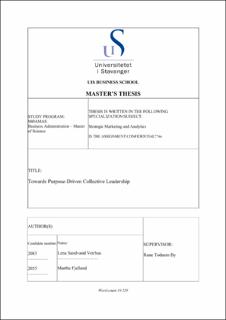| dc.description.abstract | This dissertation aimed to explore leadership through viewing it as a purpose-driven collective process. Traditionally, leadership has been viewed as an influence process where leaders directed followers, which has prevented exploring the essence of leadership. This old tripod ontology is challenged by viewing leadership as collectively producing PAC- purpose, alignment and commitment, through three practices: change readiness, psychological safety and futures literacy. Exploring how these can be implemented and the implications, creates the basis for the analysis.
The world view of this dissertation is interpretivism. Through qualitative analysis, seven categories emerged as relevant for answering the research question. The findings revealed the delivery of PAC calls for improvement, as there is a lack of clear purpose. Identifying and communicating a clear purpose will be beneficial, as it guides everyone towards a common goal. In addition, findings imply that leadership culture supports implementation of PAC, based on views from informants.
Exploring leadership through PAC contributed to a broader understanding of peoples’ involvement and understanding of leadership, compared to the tripod view, as it acknowledges the collective contribution. Through a cultural approach to leadership, viewing it as a continuous flow of practices, the understanding of why and how to implement PAC is strengthened. This is due to a deeper comprehension of interactions and relationships within the organisation. Implications of introducing PAC were both positive and negative. Findings suggest that it will lead to more inclusion, common sense of purpose, clear communication, strengthening the sense of responsibility and ownership. The main concern was the lack of inclusion of staff in futures processes, as it decreases ownership, readiness alignment and commitment. Together with an undefined purpose, it results in more individual working as opposed to collective.
Future students are recommended to build on this dissertation through the use of different methods and practices. Futures literacy should also be further explored, and existing leadership theory challenged. Further, practitioners are recommended to deliver leadership through PAC and implement leadership as practice by introducing the relevant practices. Together with knowledge transfer and embracing failure, this will encourage involvement and contribution. | |
